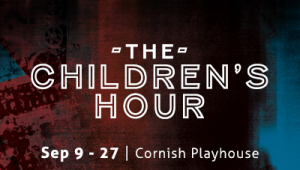At the end of my second week at Pride Foundation, I had the pleasure of attending Intiman Theatre’s production of The Children’s Hour. This rendition of the play, set in a boarding school in Seattle in the 1980s, chronicles the reverberating and tragic impact of a simple lie.
Mary, a wealthy young girl, is convinced that her two teachers, Martha and Karen, are treating her unfairly. As a result of her disdain, Mary starts a rumor that Martha and Karen are lovers. The rumor mill of the wealthy elite in Seattle runs its course—resulting in the removal of all the girls at the school.
The final act of the play shows the devastating impact of that one lie—the two women are socially ostracized and left with a failing school.
As someone who doesn’t regularly attend theater performances, I was incredibly impressed with the diversity of the cast and the thought-provoking emotions conveyed throughout the play. I left with a few reflections, which I wanted to share:
- Group think still exists and is extremely powerful—especially within social groups which hold power and privilege in society. The play was centered on a lie, which made its way through the rumor mill, started by a privileged young girl. The lie, that the two female teachers at the school were lovers, was believed and spread by the girl’s grandmother, particularly in her circle of wealth within Seattle.
- Building upon the rumor mill, I was impressed with the ways in which race, class, and sexuality were all important and often nuanced elements of the play. It was very applicable for the production to elevate these elements, particularly in a play that is set in Seattle. It reminds the audience that these are relevant factors in social interactions, even today.
- Finally, personal struggles of shame and authenticity in one’s identity transcends time. In the final act of the play, you see Martha and Karen left completely bankrupt in their empty school. In painful and tragic monologue, you hear Martha come to terms with her sexuality—and the shame that she feels it has brought upon other people. At the same time, the audience was acutely aware that Martha’s feelings of shame were a result of the way that the community treated her. Ultimately, Martha is unable to overcome this shame—a feeling that we know still exists in our country today, particularly in more rural and remote areas, with less access to resources and social support.
Overall, I was extremely impressed with Intiman Theatre’s rendition of The Children’s Hour. The play had you laughing at moments, thinking critically about the social stigma that still exists in our society, and reflecting upon the realities of shame and judgment that many of us in the LGBTQ community still face today. I was sad to only make it to one of shows in the 2015 festival—but look forward to more to come!
Kim Sogge is Pride Foundation’s Regional Philanthropy Fellow. Email Kim.
